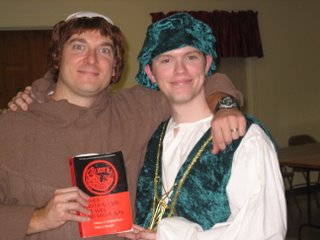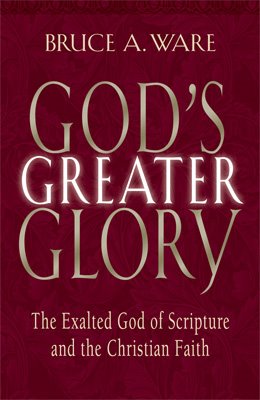Most students I know hate being required to do anything, especially things that require the use of their time. Even in Christian schools and seminaries, it is becoming increasingly rarer to find students who enjoy going to required chapel services. Yet, when the chapels are made voluntary, human nature takes over to persuade us that our time would be better spent in pursuits other than the worship of God in the community of our fellow peers and professors. My friend, Shane Walker, was one such student until recently.
Shane is a seminary student who will be graduating this May. He is one of the most careful and thorough thinkers I have ever met. Though possessing a benevolent demeanor, Shane will often hit you over the head with his intellectual hammer, forcing you to think seriously about issues you may not have given much thought to before. But more importantly, Shane can also hit you where it really counts... with thoughtful words that convict the heart. By his request, I have decided to post this moving confession which he felt compelled to create and share with others.
In Defense of Chapel and Good MannersBy Shane Walker
I once found a man relieving himself on my lawn. He did not appear to be mad or drunk. I was so shocked that my first comment was idiotic and unintelligible. He smiled and continued. My wife and daughters might come outside at any moment, another woman might pass. This affront had to stop. So, I yelled a clear, precise command and started advancing toward him. Frightened he ran away.
I bring this up to vividly illustrate manners. They are a group of mostly unwritten rules that help us function together as a group by smoothing communication and increasing civility. Without them there is increasing complexity and confusion in social relationships. My mother never told me not to pee in the neighbor's yard or not to type the words I yelled. These things are imbued in us by our culture, affinity groups, families, and so on. We don't generally talk about them, and all groups, small and large, have them.
The case can be made that God gave us manners as part of his common grace. They exist as law without legislation and order without tyranny. Manners are the actions by which we love each other socially. In Japan they bow, in Russia they kiss, and in America we shake hands, but in every case the manners serve to communicate social acceptance or love.
And with this all said, I now have a confession. I have only attended chapel three times since coming to seminary two years ago. This was rude.
It was bad manners. It was a sin (and I don't use the word lightly) of omission.
Let me explain why this is so in a very individual case. I have a coworker who lives overseas. His father-in-law is a brilliant scholar who visited campus and gave a chapel address. In his sermon he attempted to demonstrate how it is that we can love our Savior through using the book of Psalms in worship. Afterwards, he stood at the back of the chapel with Dr. Mohler and shook peoples' hands. If I had attended chapel, I could have stood in line, thanked him briefly for showing me how to worship our mutual Lord, and told him how much I appreciated his son-in-law. He might have been encouraged in the Lord. Here he was away from his everyday life, and his son-in-law's friend had stood in line and said hello and talked about the things that he loved. It would not only have been good manners, it would have been the godly thing to do.
But I didn't go to chapel. No, instead I came out of the gym wearing my exercise clothes, recognized him in the hallway, forgot his name, bungled shifting my gym bag to shake hands, and attempted to introduce myself. It was rude, I shamed myself, my friend, and confused a kind Christian scholar away from home.
If I had been in chapel, I would have been dressed appropriately, his name would have been clearly printed in the bulletin, and he would have been ready to be introduced to new people. But
in my selfishness, I rejected all of the structures presented to me for the purpose of allowing one Christian to get to know another in a large group.
I decided to not love the visiting professor, my friend, or Southern Seminary, but I did love my smallest, least attractive self.
When this behavior that I exhibited is repeated hundreds of times in the same community, something happens, there is a decline in civility and manners within the community.
We don't think about manners until they begin to break down. And I suspect within our seminary we are beginning to experience such a tottering.
Every community is defined by what they love. At Southern chapel serves as a time to adore the person we most love, Jesus Christ, as a community. On Sunday mornings we go our separate ways and worship Christ as congregations, but at chapel we worship Christ as a seminary. Further, Christ taught us in the parable of the good Samaritan that it is proximity that creates a neighbor. And we find that chapel is the only time when we can consider as a full community how it is that we should love each other.
Because one cannot preach from the Word without addressing these issues-love of God and love of neighbor-chapel serves as time to consider how to love Christ, our seminary neighbor, and those who are not members of our community. Each speaker, regardless of his denominational commitments or theological loyalties, opens a Bible that can only be applied to teaching us the manners of heaven.
When a speaker comes and is greeted by a half empty chapel, he is not being loved. When we refuse to meet with each other to worship, we are saying not only something about our love for each other, but about our corporate love for Christ. The issue then is that when I didn't attend chapel for any excuse but necessity, I was not loving you my neighbor or Dr. Mohler or Southern Seminary or other Southern Baptists or a visiting professor with a burden to share from the Lord, but I was loving myself. I wasn't quite up to the obvious rudeness of my opening illustration, but it was close, and it was certainly bad manners.
And how did I discover this? Well, the administration is making me go to chapel as a requirement for a class. You see,
when manners break down, law becomes necessary. The unspoken understanding must be written down, enforcement mechanisms must be created, and I was proven more uncouth and immature than I had ever understood.


